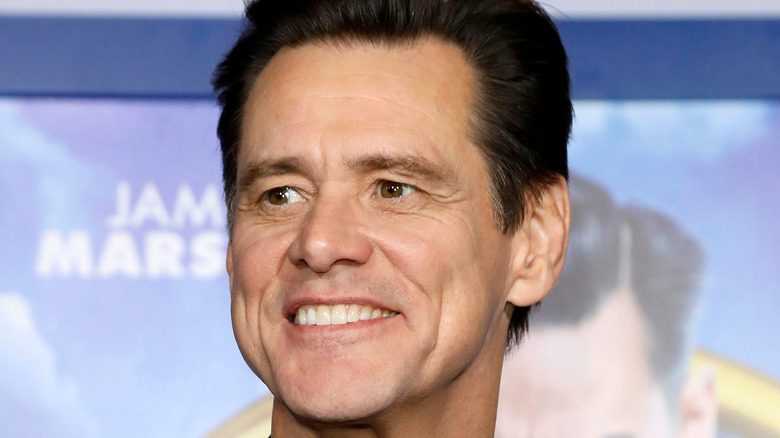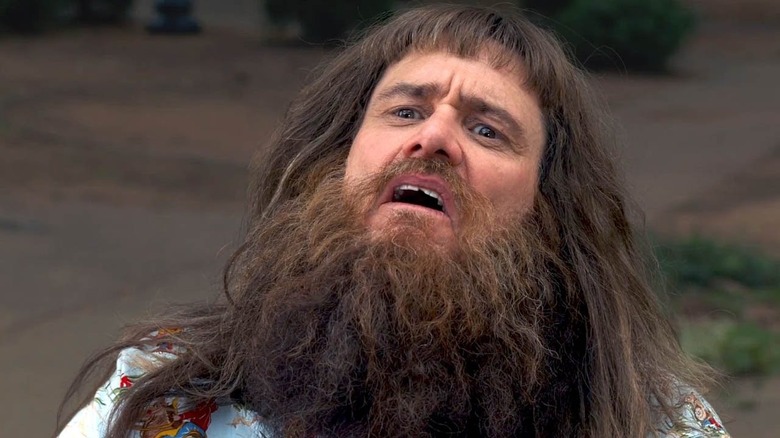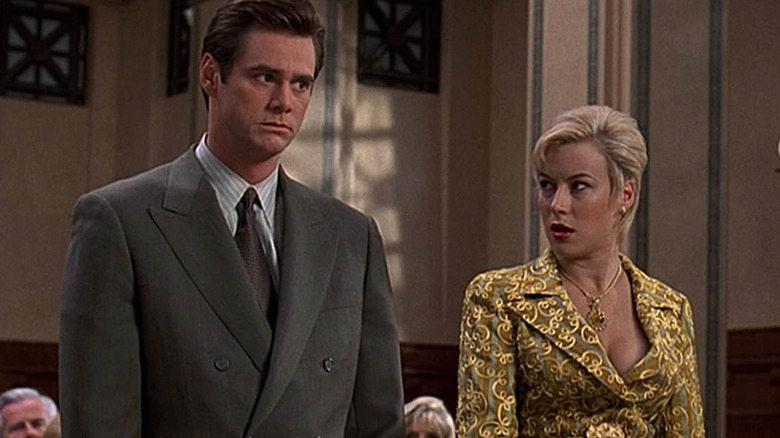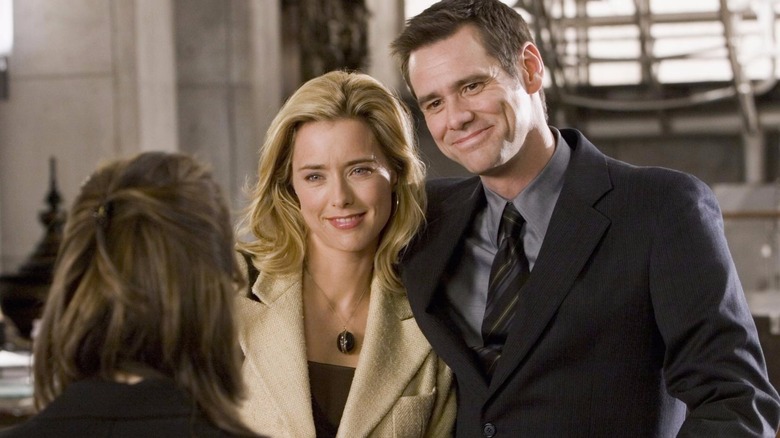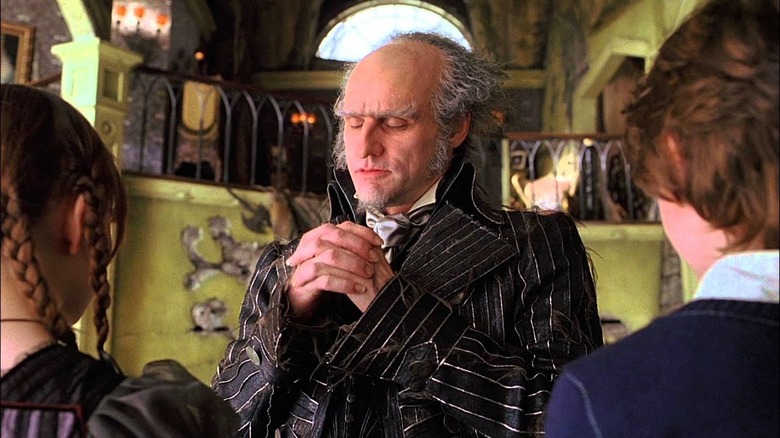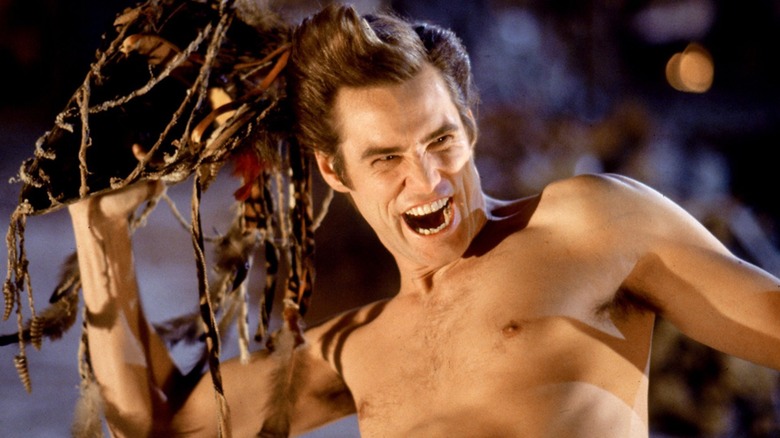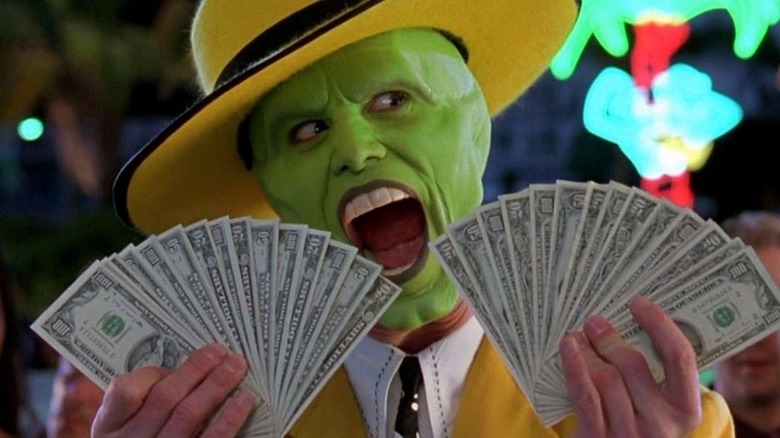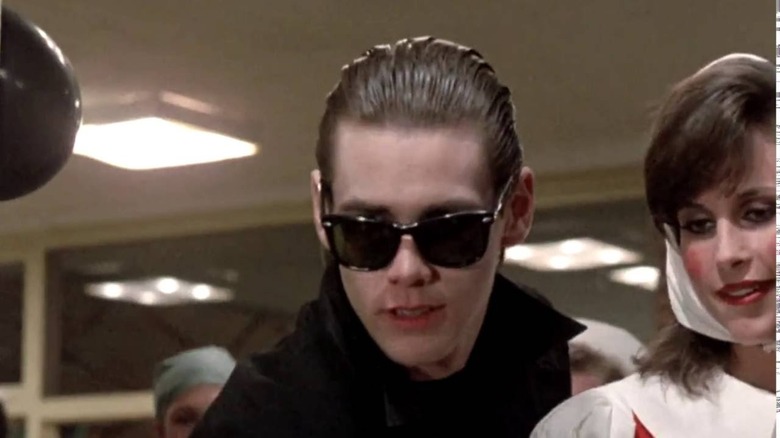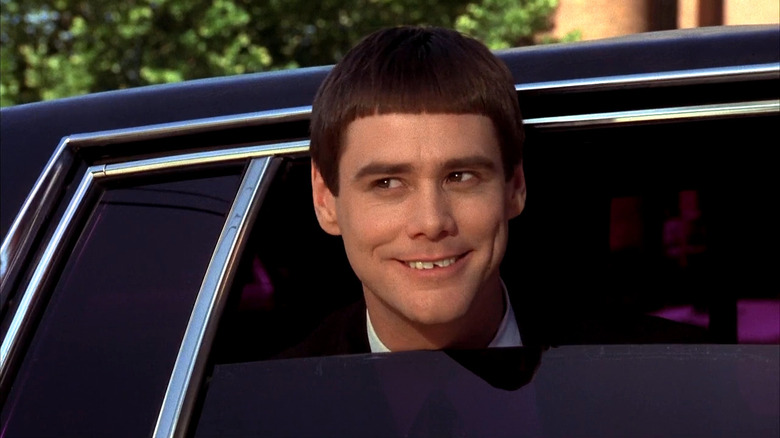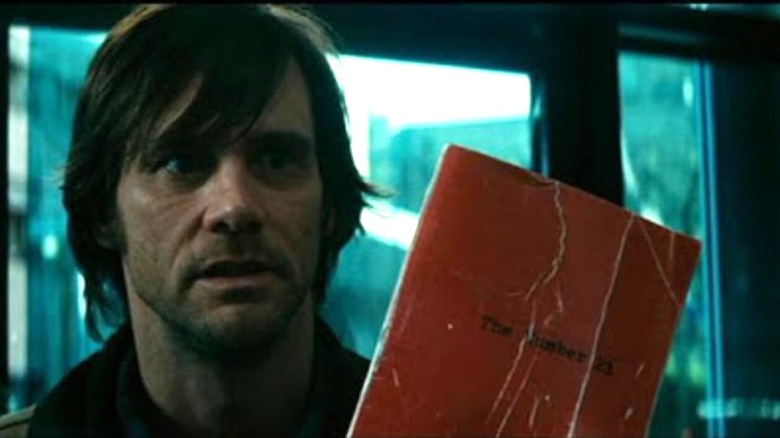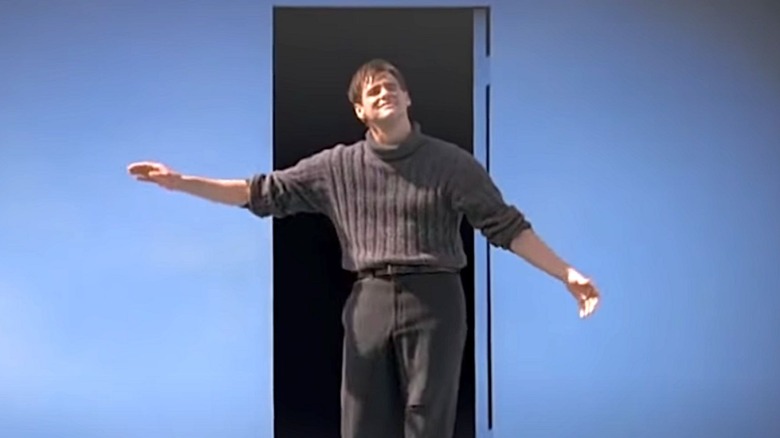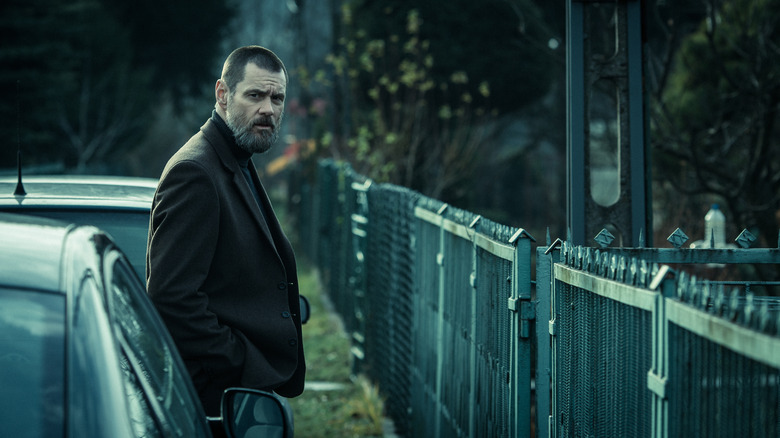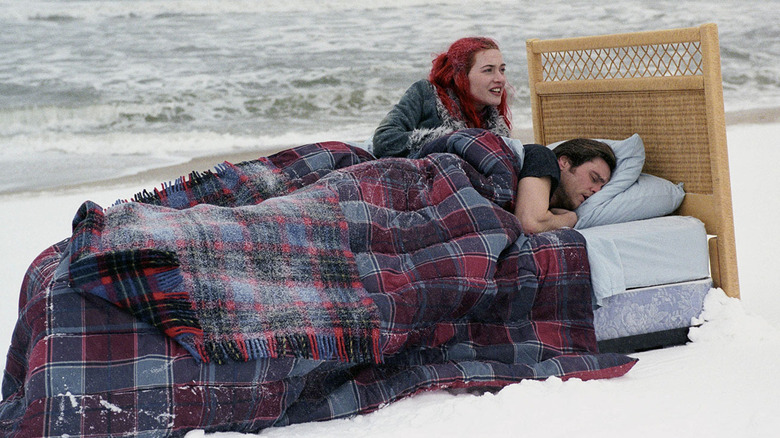Jim Carrey's 6 Best And 6 Worst Movies
Jim Carrey is a man of extremes. He's either stretching his face to breaking point in an outrageous, over-the-top comedic performance à la "Dumber and Dumber," "Ace Ventura," and "The Mask," or tugging at your heartstrings with tender, more subtle roles in "The Truman Show" and "Eternal Sunshine of the Spotless Mind."
Sadly, and happily, this can describe the quality of his movies, too. For every comedic cult classic in Carrey's filmography, there's a lousy, unfunny flop to match it. And for every skippable, misguided thriller, there's a dramatic masterstroke that outshines it.
His movies are hit or miss, but that doesn't mean we love him any less than we did when he first manically exploded onto the screen in the late '80s. So what are Jim's best movies? What are his worst? Get ready to laugh for the right and wrong reasons. These are the 6 best and 6 worst Jim Carrey movies of all time.
Worst: Dumb and Dumber To
If only it was obvious which films could use a sequel and which should be left alone. 1994's "Dumb and Dumber" was a surprise hit, funnier and dare we say smarter than any movie about two wacky buffoons had any right to be. But it was also a movie that was treading on thin ice (we promise that's not a reference to the skiing scene): If it tipped any further into its own absurdity, it would've been consumed in pratfalls and fart jokes and never found its way out.
Tragically but not all that surprisingly, 2014's "Dumb and Dumber To" fell off the balance beam early on. Perhaps it's because it came out far too late, and revisiting two manbabies and realizing they haven't matured in 20 years is almost more sad than funny. But that's only part of it. The jokes that were endearing in 1994 just seem glum. Said Joe Neumaier for the New York Daily News, "From junky production values to the parade of unfunny supporting characters to its lazy energy, 'Dumb and Dumber To' falls on its face."
We're not sure what to do with this information, but it's worth mentioning that "Dumb and Dumber To" was inadvertently made with cash stolen from the Malaysian government, according to CNN Business. Now that would've made for a funny Harry and Lloyd adventure.
Best: Liar Liar
In "Liar Liar," Jim Carrey plays Fletcher Reede, a lawyer who, after building his career on lying, is cursed to only speak the truth for 24 hours. You probably saw the ending from miles away, in which Reede learns the value of honesty and promises to spend more time with the family his pathological dishonesty has alienated. But that's okay. It's the journey, not the destination, that makes the movie work.
The movie combines the best of both worlds when it comes to Jim Carrey movies. We get Carrey's huge and screen-grabbing performance, complete with loads of physical humor, and a tender, funny script with something to say. Miraculously, the two don't step on each other's toes at all. Instead, Carrey got to showcase his more mature side. It's no "Eternal Sunshine of the Spotless Mind" in that regard, as he's still undeniably '90s-era Jim Carrey here, but he did get to prove to future filmmakers that he had more to offer than outrageous, rubber-faced buffoonery.
The positive critics consensus on Rotten Tomatoes reads, "Despite its thin plot, 'Liar Liar' is elevated by Jim Carrey's exuberant brand of physical humor, and the result is a laugh riot that helped to broaden the comedian's appeal."
Worst: Fun with Dick and Jane
Good films should be left alone. Films that could have been good are more ripe targets for reboots. Unfortunately, 2005's "Fun with Dick and Jane," starring Jim Carrey and Téa Leoni, didn't even reach the mediocre bar set by its 1977 predecessor of the same name. The pieces are all there — when Dick Harper's company goes bankrupt, he and his wife Jane turn to a life of crime — but the movie retreats to an uninspired slapstick formula whenever it has an opportunity to do something more interesting. It could have had more fun with the characters or used Jack's flopped business as a way to lampoon corrupt corporate culture (it at least would've made the film relevant for the mortgage bubble collapse a few years later!), but it chooses to play it safe and suffers as a result.
Said RogerEbert.com, " ... the movie avoids the rich opportunities to plop Carrey and Leoni into the middle of a political lampoon, and turns to tired slapstick, wigs, false beards, 'funny' bank holdups, and so on. There is a late attempt at a comeback as the Alec Baldwin character [who plays CEO Jack McCallister, Dick's former boss] tries to get his loot out of the country, but by then it's all too neat and too late."
According to Rotten Tomatoes, Ebert wasn't alone in his assessment; the critics consensus reads, "This muddled comedy has a few laughs, but never sustains a consistent tone."
Best: Lemony Snicket's A Series of Unfortunate Events
Based on the first three novels of the series of the same name, 2004's "Lemony Snicket's A Series of Unfortunate Events" by Daniel Handler follows the dastardly Count Olaf (Carrey) and his endlessly creative attempts to steal the inheritance of the three Baudelaire children, distant relatives who were orphaned after a house fire and placed in his custody. After Olaf's attempt to have them killed fails, the children are placed in the charge of different relatives around town. Olaf is never far behind, always dressed as different characters to meddle with their plans. He must not be as talented as he thinks, because the children never fall for his ruses and always use clever inventions to thwart Olaf before it's too late.
As Olaf is a stage actor who seizes every opportunity to don elaborate disguises (both for fun and to deceive the Baudelaires), Carrey has plenty of opportunities to have fun here. And critics noticed: His characteristically ludicrous performance was the centerpiece of the movie.
On Rotten Tomatoes, the critics consensus reads, "Although it softens the nasty edges of its source material, 'Lemony Snicket's A Series of Unfortunate Events' is a gothic visual treat, and it features a hilariously manic turn from Jim Carrey as the evil Count Olaf."
Worst: Ace Ventura: When Nature Calls
In 1994's "Ace Ventura: Pet Detective," the titular character — a detective who lives with animals and solves pet-related crimes — is tasked with finding the abducted dolphin mascot of the Miami Dolphins' NFL team. It wasn't Carrey's best role or movie, but it's got enough of his charming, goofball absurdity to be a fan favorite. So with a popular character, a lovable lead, and a low bar to clear, a superior sequel should've been within reach.
Unfortunately, 1995's "Ace Ventura: When Nature Calls" didn't come close. Carrey reprises his role as Ace, who's been summoned to Africa from his Himalayan retreat. His mission: to stop a pending civil war by tracking down a stolen bat that was offered as an engagement present by the prince of one tribe to the princess of the other. The offensive stereotypes of Africans, chucking spears with bones in their noses, will make you squirm. But the movie's humor falls flat regardless. Most of the "jokes" are just Jim Carrey screaming and wailing around, sucking all the oxygen off the screen, and leaving little room for the story to breathe. As much as we all love Carrey, he was simply too much in this sequel. Besides, the film had nothing to say that the original "Ace Ventura" hadn't already pounded into your head.
The Rotten Tomatoes critics consensus puts it thusly: "Nature Calls in this Ace Ventura sequel, and it's answered by the law of diminishing returns."
Best: The Mask
In "The Mask," Carrey plays Stanley Ipkiss, an unlucky loser whose car beaks down at night on a bridge. When he thinks he sees someone floating in the waters, he leaps into the sea to save them. The face he saw is actually an ancient, cursed mask, which turns its wearer into The Mask — a green-faced, zoot-suit-wearing, and troublemaking wiseass who can cartoonishly alter himself and his surroundings at will. His self-doubt evaporates behind this new identity, allowing Ipkiss to go on a riotous rampage throughout the city humiliating his tormentors, confounding the police, stopping robberies, and winning the affections of Tina (Cameron Diaz), the woman he loves.
Not every movie can benefit from the wild, otherworldly energy Carrey is known for, but "The Mask" was made for him. It makes the most of every facial contortion, every weird sound, every over-the-top laugh, and dials it all up to levels even he can't reach alone. Roger Ebert said it best: "'The Mask' is a perfect vehicle for the talents of Jim Carrey, who ... seems to have found a story and character that work together with manic energy. One of the key design decisions on the movie must have involved the Mask character's makeup. It transforms Carrey's features into a much larger, comic-bookish parody, but at the same time the features are still able to move in a lifelike way" (via RogerEbert.com).
Worst: Once Bitten
In 1985's "Once Bitten," directed by Howard Storm, an ancient vampire (Lauren Hutton) maintains a youthful appearance by drinking the blood of male virgins. However, this proves difficult in 1980s Los Angeles, a city whose hedonistic culture produces frustratingly few unsexed victims. When she meets Mark Kendall (Jim Carrey in his breakout role) at a club, she lures him away from his girlfriend (who has been reluctant to have sex with him thus far) and does the dirty deed at her home. When his girlfriend notices his strange vampiric behavior after the fact, she hatches a plan to defeat the vampress and return her boyfriend to normal.
It could have been fun. But an '80s teen sex comedy with a twist is still an '80s teen sex comedy. Not exactly a genre that's aged well. If its terrible Rotten Tomatoes score is any indication, the few critics that bothered sharing their thoughts on the movie didn't think it rose above regrettable genre tropes.
"Bad as 'Once Bitten' is," wrote Joy Bayar for "The Orlando Sentinel," "it does have some redeeming features, such as the performance of Jim Carrey. This lanky, rubber-faced actor has all the charm and talent of the young Dick Van Dyke." She goes on to write, "Also of interest is Lauren Hutton ... she seems to be having a wonderful time. Which is more than I could say for myself as I watched this stupid picture."
Best: Dumb and Dumber
In "Dumb and Dumber," two dimwitted friends, dog groomer Harry Dunne (Jeff Daniels) and limo driver Lloyd Christmas (Jim Carrey), embark on a road trip to Colorado to return luggage to Mary Swanson (Lauren Holly), a woman Christmas became infatuated with at the airport. But the briefcase is actually full of ransom money, roping the pair into a wacky criminal scheme.
Let's just get this out of the way: "Dumb and Dumber" lives up to its name. It's as stupid as its main characters, but that's why it works. It succeeds where other goofball comedies fail because it manages to let its leads shine in all their absurd, slapstick glory, while still paying proper attention to the story and supporting characters. Jeff Daniels, who had just done "Gettysburg" the year before and who's far more known for dramatic roles, holds his own as an outrageous buffoon. And Carrey's performance cemented him as perhaps the most famous comedic actor of the '90s.
Rotten Tomatoes summarizes its positive critics score with this consensus: "A relentlessly stupid comedy elevated by its main actors: Jim Carrey goes bonkers and Jeff Daniels carries himself admirably in an against-type performance." Even Roger Ebert wasn't immune to the movie's charms. He only gave it 2 out of 4 stars, but admitted that a scene in the beginning, revolving around a blind boy and a pet parakeet he didn't know was dead, "made me laugh so loudly I embarrassed myself. I just couldn't stop."
Worst: The Number 23
It's nice when comedians do more serious work, isn't it? Think Robin Williams in "Good Will Hunting," Melissa McCarthy in "Can You Ever Forgive Me?," and Adam Sandler in "Uncut Gems." Jim Carrey's no stranger to drama either, having received acclaim for his performances in "The Truman Show" and "Eternal Sunshine of the Spotless Mind." But not every dramatic turn of his met with that much success. Or any success at all, for that matter.
Enter: "The Number 23." In this inept 2007 thriller, Carrey plays Walter Sparrow, who becomes obsessed with the number 23 after reading a book about it that he thinks is based on his life.
According to Rotten Tomatoes, there was little critical love for the movie. "Jim Carrey has been sharp in a number of non-comedic roles," reads the critics consensus, "but this lurid, overheated, and self serious potboiler is not one of them. 'The Number 23' is clumsy, unengaging, and mostly confusing."
Best: The Truman Show
One of the most beloved gems of the '90s, "The Truman Show" follows Carrey as the titular Truman Burbank, a resident of Seahaven Island whose happy routine is suddenly interrupted by unusual events. A spotlight falls from the sky onto his yard. A radio program describes everything he's doing in real time. And for some reason, everyone in town is desperately trying to keep him from going on his first road trip. He then discovers something about himself that the entire planet already knows: He's the unwitting star of a smash hit reality TV series based on his life called "The Truman Show." Seahaven Island is actually a film set encased in a great dome and populated with actors paid to keep up the ruse whenever they see him. In the end, Truman escapes, much to the disappointment of the executives running his life and to the delight of millions of viewers glued to their screens in the real world.
There's something profound to be said about that, isn't there? Truman longs to escape his fake world to visit the real one, where people obsess over his scripted existence. Perhaps the grass really is greener wherever you're not. The movie was a critical darling. On Rotten Tomatoes, the critics consensus reads, "A funny, tender, and thought-provoking film, 'The Truman Show' is all the more noteworthy for its remarkably prescient vision of runaway celebrity culture and a nation with an insatiable thirst for the private details of ordinary lives."
Worst: Dark Crimes
Jim Carrey and his beard star in this gritty 2016 crime drama as Tadek, a detective who uncovers dark secrets after noticing similarities between a seemingly open-and-shut murder case and a fictional killing depicted in a novel. It's an interesting, true story, per Decider. In the right hands, it could've been something recommendable. But it wasn't to be.
Carrey tries his best here, but it's not enough. The movie is too poorly paced and boring to justify its sheer joylessness. On Rotten Tomatoes, where it received no love whatsoever, the critics consensus reads, "'Dark Crimes' is a rote, unpleasant thriller that fails to parlay its compelling true story and a committed Jim Carrey performance into even modest chills."
If you think that's harsh, get a load of these reviews. For the New York Post, Johnny Oleksinksi writes, "That this exercise in vulgarity was made at all is shameful." Andrew Gaudion wrote for THN, "It's very rare for a film to pretty much have no redeeming features about it, but 'Dark Crimes' is essentially impossible to recommend beyond those who have a morbid curiosity." For Spectrum Culture, Josh Goller says, "There's not even much novelty in seeing Carrey play so aggressively against type in this oppressively artless slog."
We have to agree. The first time you see comedians in dramatic roles, it can be a draw. But Carrey's done it more than once, and even if the novelty hadn't worn off, it wouldn't salvage this inept flop of a thriller.
Best: Eternal Sunshine of the Spotless Mind
As evidenced by its darling critical reception (per Rotten Tomatoes), "'Eternal Sunshine of the Spotless Mind," about two wounded former lovers who undergo a procedure to erase each other from their own memories, simply has it all. Beautiful writing, direction, music, and cinematography. Nothing is over explained or underdeveloped. Every nook and cranny of this premise is explored, leaving the viewer just as touched and satisfied at the end of the movie as they were intrigued at the beginning. A better version of the story simply does not exist, making "Eternal Sunshine" not just a great film, but a perfect one.
But of course, Charlie Kaufman's screenwriting wizardry and Michel Gondry's heartfelt directorial touch would be nothing without the right leads. Kate Winslet gives one of her most underrated performances as Clementine, and Jim Carrey stars as timid, gentle Joel Barish. Both are excellent, but what makes Carrey's performance stand out is, well, how little he stands out. For once, Carrey isn't manic, loud, or making wacky faces. He's a disarmingly quiet, soft-spoken man carrying heavy emotional baggage. It's not a slight against him at all to say that his best performance in his greatest movie is the one least like his others. Time Out put it well: "the formidable Gondry/Kaufman/Carrey axis works marvel after marvel in expressing the bewildering beauty and existential horror of being trapped inside one's own addled mind, and in allegorising the self-preserving amnesia of a broken but hopeful heart."
